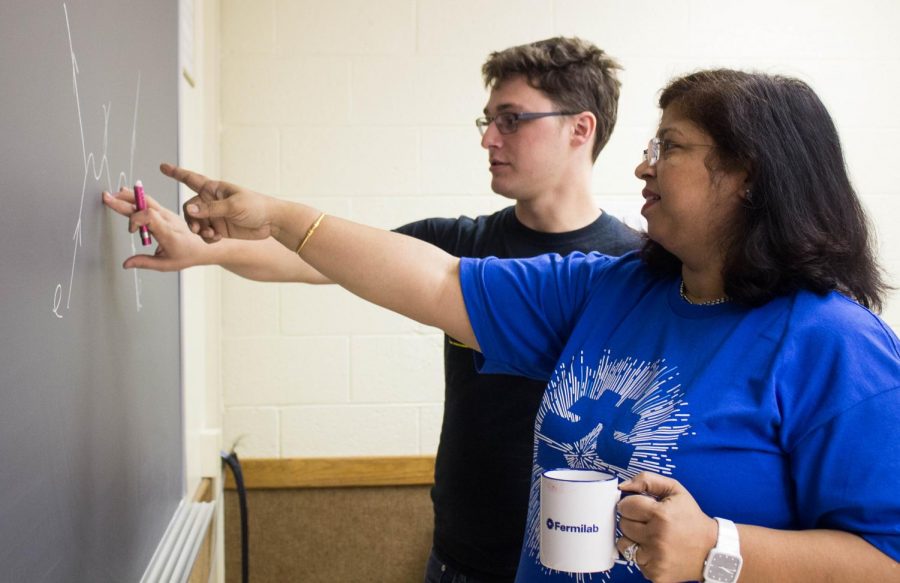Student advances particle physics field with research in Switzerland
Professor Parashar, leader of high energy physics research and student, Christopher McGrady discuss physics concepts and formulas.
Christopher McGrady, junior physics and math major, was invited to conduct research in Geneva, Switzerland with Neeti Parashar, physics professor, during the summer.
McGrady attended Parashar’s spring 2016 modern physics class. Parashar was impressed with McGrady’s grasp of physical concepts and mathematical skills as well as his desire to work with her in experimental particle physics.
“He was, by far, one of the smartest students I’ve had and stood out to me, so I had an opportunity to evaluate his skills,” Parashar said. “He was very persistent, which I like very much. That tells me the students are very keen on learning and really want to be in their field.”
Although all of Parashar’s students begin their work at Fermilab, she said she felt McGrady was ready to go straight into research.
“I think it’s very exciting, especially for an undergraduate,” Parashar said. “I think it’s a very unique opportunity that I’m able to provide to other undergraduate students to work at these state of-the-art laboratories known for global scientific discoveries.”
Leading the high energy physics program, Parashar and her particle physics team conducted research on the Compact Muon Solenoid experiment. The solenoid is designed to search for particles and matter with a particle physics detector built at CERN, the European Organization for Nuclear Research. This experiment gives insight into how particles interact and the basic laws of nature, which is important for the world of science.
Under the care of one of the postdoctoral researchers in Parashar’s group, McGrady took part in the experiment at CERN to support Parashar’s research in detecting particles and to advance his own career in high energy physics. McGrady was there for three months in the summer, and Parashar joined him for the last two weeks.
While there, McGrady worked under Will Johns from Vanderbilt University at Nashville and Karl Ecklund from Rice University on the solenoid, which is one of the four detectors on the Large Hadron Collider. The collider collides protons together, and a pixel detector inside tracks charged particles from the collision that passes through it.
As part of the Pixel DAQ Group, which ensured accurate data was taken by the pixel detector, McGrady was tasked with testing the pieces of the pixel detector that would integrate with the rest of the solenoid. He documented the testing procedure along with his observations. Parashar said the procedure is important when evaluating physics analysis.
“We need to detect these particles because when we are trying to make physics sense out of data and that accelerator is crunching, then we need to know where the particles came from and their traces,” Parashar said. “If we don’t know that, we won’t be able to say what particles we discovered.”
The experiment helped the PNW physics program to continue their work and gave McGrady knowledge regarding research in his field.
McGrady said it was a wonderful experience because the research has helped him prepare for graduate school and his career in high energy physics.
“I got to attend lectures on high energy physics, experience other cultures, enjoy new foods and learn new languages,” McGrady said. “I met with a lot of doctoral fellows, postdoctoral researchers and graduate students from other colleges which helped me to start forming my professional network.”
Funded by the National Science Foundation, Parashar’s team started this research in 2005 at the Fermi National Accelerator Laboratory, also known as the Fermilab, a U.S. Department of Energy lab specializing in high-energy particle physics.
As the principal investigator of federal support, Parashar received over $2 million to support PNW’s high energy physics research agenda and used these funds to send McGrady to Geneva in the summer to work on the experiment.
Parashar said PNW is the only institution in Northwest Indiana pursuing high profile research.
“By us being a part of these scientific, global, discovery-driven laboratories, PNW is on that global map of discovery-driven research,” Parashar said. “As an undergraduate institution it means a lot to us to be able to do the same things any other research institution would do.”



